How popti parties, once a plain traditional earthenware cooking tradition, have become a popular retreat route for city-dwellers. Have you been invited yet?
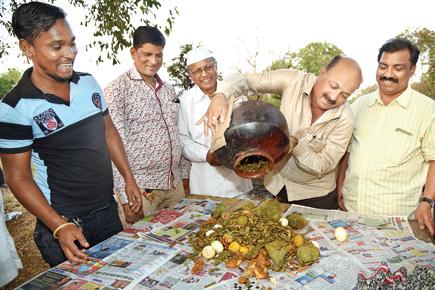
Poet L B Patil (third from left), who is organising a popti party on April 17, has had to ask some of his friends to drop out so that he can accommodate first-time guests
 The Panvel-based organisers of the annual Tarangate Popti Kavi Sammelan (Floating Popti Poets’ Meet) were not very busy people, until recently. Each year they would leisurely ready up for an evening cruise, on which poetry was savoured with the local recipe cooked in a terracotta pot. The cruise was limited to friends and family from Raigad’s coastal towns of Uran, Roha, Pen and Alibaug. A manageable handful would gather at Navi Mumbai’s JNPT port to sail up to Elephanta Island over three hours.
The Panvel-based organisers of the annual Tarangate Popti Kavi Sammelan (Floating Popti Poets’ Meet) were not very busy people, until recently. Each year they would leisurely ready up for an evening cruise, on which poetry was savoured with the local recipe cooked in a terracotta pot. The cruise was limited to friends and family from Raigad’s coastal towns of Uran, Roha, Pen and Alibaug. A manageable handful would gather at Navi Mumbai’s JNPT port to sail up to Elephanta Island over three hours.
ADVERTISEMENT
With origins in Raigad district, popti is a small-scale farm-based festivity, usually held during the harvest season of December to March. The village style barbeque thrived in Panvel, Alibaug, Roha, and Pen where the soil (a mix of shoreline salinity with river silt) favoured the growth of tender waal (high-iron, high-fiber field beans). Lining the pot with medicinal bhambrut leaves, which are velvety and release juices of their own in which the food gets cooked, popti ensures steaming of onions, garlic, potatoes, eggplants, groundnuts, chickpeas, eggs and marinated meat in a pressure-packed pot cooked under a smoky fire, in a record 15 minutes. The popti pot serves as a campfire in an open green space. It is also called ‘mongo’ or ‘ukad handi’ in some parts of Konkan.
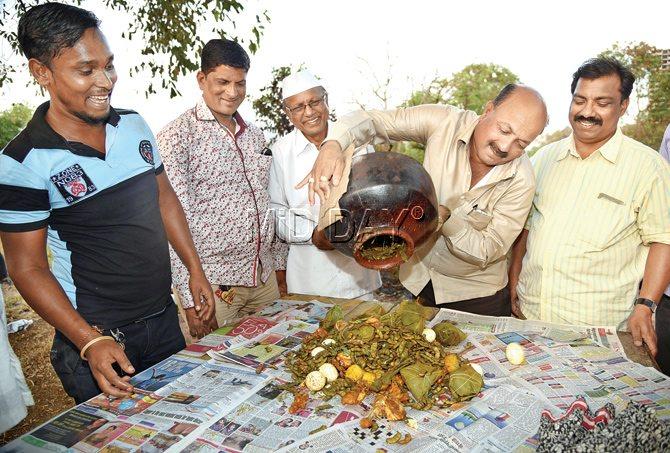
Poet L B Patil (third from left), who is organising a popti party on April 17, has had to ask some of his friends to drop out so that he can accommodate first-time guests. Pics/Sameer Markande
Over the last two years, more city-bred partygoers have been signing up for the popti ferry ride famed for an unmistakable aroma, citing interest in photographing the popti-on-the-deck experience. The upcoming April 17 cruise, advertised in papers, is already overbooked. More than arranging for the poets, sponsors are now tackling the logistics of transporting the pre-cooked popti, to be served hot, on the moving vessel. Chief sponsor, and poet, L B Patil ha asked several close friends to opt out in favour of first-time Mumbaikars keen on a sunset popti on the Arabian Sea.
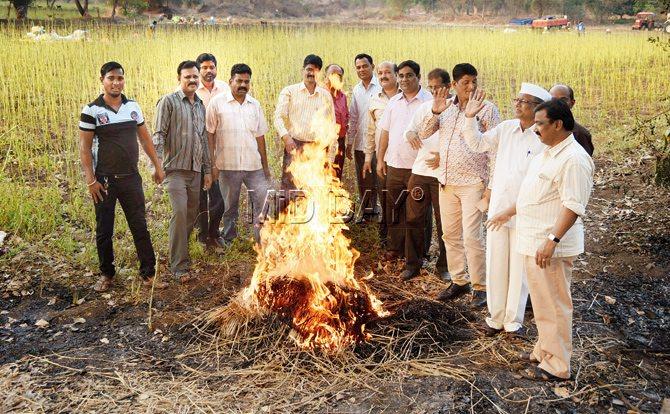
Over the last few years, several farms and hotels along the Mumbai-Goa highway have been offering popti tours to urban dwellers looking to join in the fun
This is not the first time that strangers have come together thanks to a popti. If the special requests registered by hotels and resorts dotting the Pen-Panvel-Alibaug highway are any indication, weekend travellers are increasingly seeking open-air popti parties in the wilderness. Naturally, ‘rustic rural stay’ ads show people gathered around a pot of unpeeled tender waal pods. Popti Tours promise a joint menu of water sports, sightseeing and night rendezvous. For instance, the Yashwant Agro Tourism’s Jambhulpada (Sudhagadh) property promotes popti cuisine as a part of “rebuilding the connection between people and a forgotten lifestyle.” Visitors are charged extra for overnight accommodation with a built-in popti slot.
Popti necessitates advance booking as it is linked with the availability of farm-fresh field beans (kadve waal) or the substitute, fava beans (waal papdi/pavta). With the rise in demand for popti, hotels often have to deal with last-minute waal shopping from the Pali and Khopoli farm markets near Panvel. A popti for a group of 15 people (it is not economical to be arranged for individuals or small groups) will require an advance booking of five days and will cost about Rs 400 per person, stay and transport extra.
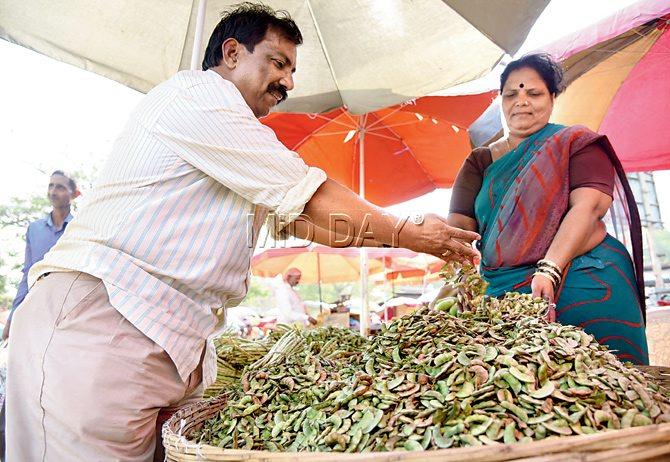
Ganesh Koli, editor of a local newspaper, checking the waal stock ahead of a popti party. Koli holds the parties at his Ritghar outhouse
Some visitors ask for variations like replacement of the waal with green peas or corn; while some seek less green and more of the herb-wrapped chicken and eggs. Madhuban Agritainment (a farm in Roha which promises “nature food and agriculture under one big sky”) prides on its pure vegetarian popti festival enjoyed by Pune and Mumbai holidayers, kicked by the idea of an antakshari or a poetry jam around a clay pot night meal.
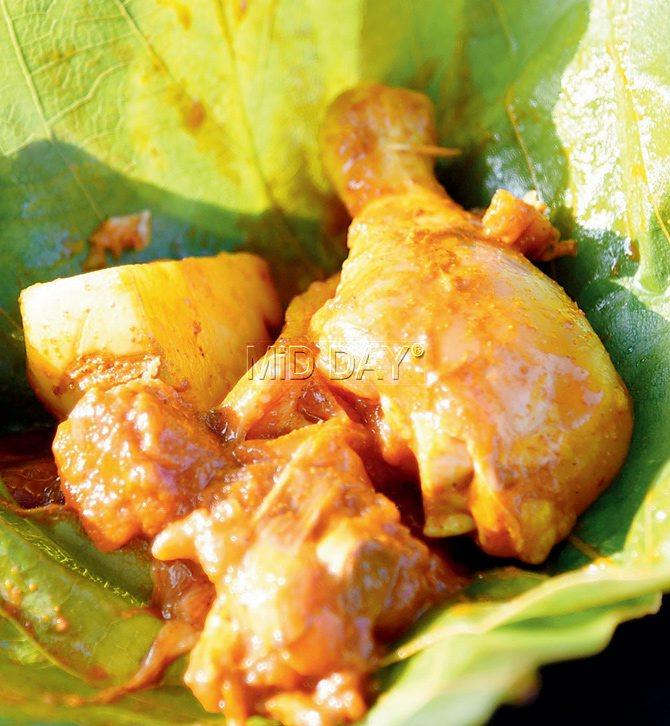
Popular in the Uran-Panvel region, popti signifies both a vegetable dish and the bonhomie surrounding it. It involves steaming vegetables (the main ingredient is the waal), in a clay pot. Once the pot is full, it is layered, covered and closed with bhambrut leaves. Then, it is placed in a pit, mouth down with half the pot above ground level. Once the set up is ready, the dry grass, straw, leaves, wood and cow dung are arranged around the pot and the bonfire lit
While the commerce around popti has flourished — with new takers beyond the traditional geographical belt of its origin — its core remains intact. It has for long been a merrymaking tool for common people in Raigad district, from Panvel serving as a connector township close to Mumbai. Several enthusiasts of Panvel and neighbouring villages — people of moderate means — have been the untiring hosts of annual popti fiestas.
Inviting a large number of city guests is a matter of personal pride, as seen in Balaram Bhalekar’s take on life. A peon at the Vaja village school, Bhalekar bears the cost (around Rs 40,000) as his social responsibility. His popti pride was duly recognised when he was recently given the Raigad Ratna award by a local organisation. “I may be a peon in a school but on that day I felt capable. I have a record of how many MLAs and councilors came to my farm.”
While Bhalekar attracts a large number, because he doubles up as chef and the popti pot setter too (150 pots to his credit), Ganesh Koli, editor of a local paper, renders his popti from a different vantage point. He treats it as a ritual picnic at his Ritghar outhouse. He is aided by friends who offer free services for retaining village pride — the indefatigable part-time real estate dealer Vishal Patil (60 poptis in just the last three months; does tutorials for amateur pot setters) who takes on the cuisine. Sudesh Dalvi, a Panvel studio owner, specialises in capturing candid moments of popti exchanges. As Patil does the ceremonial popti pooja, a prayer to the annadevta by lighting incense sticks, Koli reaches out to each guest. This year, Koli was graced by Charusheela Gharat, the first citizen of Panvel and head of the municipal council at whose hands Koli felicitated a motley mix of letter writers, small-scale entrepreneurs, senior citizens and waal growers. A Youtube video of the event covers a blow-by blow account of layering of the pot with waal and other leguminous plants, rock salt, carom seeds and a seasoning of chillies.
Politicians, local and otherwise, seem to appreciate the popti magic across ideological party divides. Until last year, Sunil Tatkare, Maharahstra’s former water resources minister, hosted the popti extravaganzas at his Sutarwadi farm house (near Roha). They enjoyed patronage from bigwigs like NCP Chief Sharad Pawar and former union home minister Sushil Kumar Shinde. Folklore has it that his chef Chandu Patil is now a popti maestro reserved for families of political pedigree.
Shiv Sena corporator from Panvel, Ramesh Gudekar has a popti theory — he says poptis allow free time when politicians can be off-guard and off-camera; “a tradition which encourages human exchange, simple pleasures of eating hot waal shenga while forgetting the usual worries of electoral politics.”
In an age of disconnect and automation, the popti has become a binding factor. In the times when healthy food is either unavailable or overpriced, popti is a metaphor for attainable nourishment. What once was a simple commonplace ritual, has today become a bright (green) spot.
Sumedha Raikar-Mhatre is a culture columnist in search of the sub-text
 Subscribe today by clicking the link and stay updated with the latest news!" Click here!
Subscribe today by clicking the link and stay updated with the latest news!" Click here!






